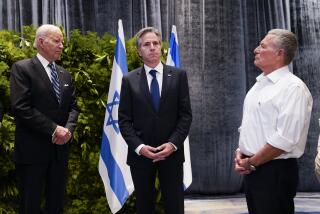U.S. Officials Discount Gulf War Involvement : Head of Joint Chiefs and 2 Key Senators Seek to Ease Tension Over Rhetoric in Washington
- Share via
WASHINGTON — The nation’s top military officer and key senators sought Friday to quell widespread fears that the United States is in danger of being drawn into war in the Persian Gulf.
“The gulf today is an uncertain place, and it can be dangerous, but it is not a war zone in the accepted use of the word. It is not a no man’s land,” Adm. William J. Crowe Jr., the chairman of the Joint Chiefs of Staff, told the Senate Armed Services Committee.
The comments, marking the end of a week of rising concern on Capitol Hill about tensions in the gulf, appeared to reflect concerns that rhetoric in the Reagan Administration and Congress has been getting out of hand.
“Let’s not war-talk this thing into an emergency,” cautioned Sen. John Glenn (D-Ohio), who returned Thursday from a fact-finding mission to the gulf.
Administration plans to allow 11 Kuwaiti tankers to fly the American flag, a move that gives the vessels U.S. Navy protection, have been the center of heated discussions in Congress for weeks. The White House maintains that the action is necessary to underscore the United States’ determination to keep open international sea lanes that are used to carry oil out of the gulf.
Opponents of this policy, however, note that the United States gets only about 7% of its oil from the region and that the tankers have been targets of Iranian attack because of Kuwait’s alliance with Iraq. Iran and Iraq have been at war for the last 6 1/2 years.
‘No Absolute Guarantees’
Nevertheless, Crowe said, “we have the capability to keep the oil line to Kuwait open, to assure our Arab friends of our commitment and to keep the risk low.” But he was quick to warn, “There are no absolute guarantees such an operation will be casualty-free.”
The House and Senate, acting on fears that the escorts could draw the United States into a military conflict, have adopted resolutions demanding information on the Administration’s plans in the region. Many legislators have argued that the Administration failed to adequately consult either Congress or the military and lacked proper plans for the escort operation.
On Friday, however, Armed Services Committee Chairman Sam Nunn (D-Ga.) backed away from those charges somewhat after emerging from a closed committee hearing with the joint chiefs. Although “I still have numerous questions about the policy,” Nunn said, “I feel better knowing that the joint chiefs have thought through” the military questions.
Congressional Mistrust Lingers
But mistrust of the Administration’s gulf plans and explanations has far from disappeared.
Sen. Edward M. Kennedy (D-Mass.) warned against allowing an American ship to “be a floating Beirut barracks in the gulf,” a reference to the bombing in 1983 that killed 241 U.S. servicemen, ending the Administration’s attempt to maintain a military presence in Lebanon.
In addition, Nunn and Sen. Carl Levin (D-Mich.) indirectly criticized the Administration’s emphasis on blaming Iran for attacks on shipping in the gulf. It was Iraq, they said, that began the so-called “tanker war.”
It was also Iraq that intensified the issue with its jet attack on the Navy frigate Stark that killed 37 U.S. sailors, though the Baghdad government has insisted that the incident was a mistake.
‘Most Unlethal War’
However, more typical of the day’s tone was Glenn’s reminder that the gulf conflict is “probably the most unlethal war in all history, as far as actually sinking ships.”
Despite a total of about 350 attacks on ships in the gulf by Iran and Iraq in the last 5 1/2 years, Glenn said, not a single ship has been sunk. “This war has not even begun to seriously interfere” with oil exports, he said.
Glenn also played down press reports that Pentagon officials are considering plans for a pre-emptive strike against Iranian Silkworm missiles based on the coast of Iran that could hit American ships in the gulf. “There may be 20 options” for American forces, Glenn said in an interview. “As of now, the Silkworm threat is still in the future.”
More to Read
Sign up for Essential California
The most important California stories and recommendations in your inbox every morning.
You may occasionally receive promotional content from the Los Angeles Times.














